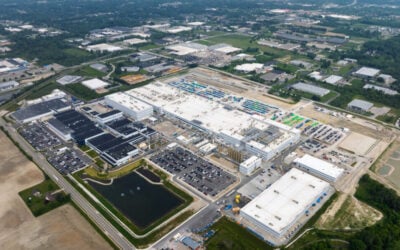
A team of technical staff working for the Idaho Public Utilities Commission (IPUC) has given its recommendation to approve a request from Boise, ID-headquartered utility Idaho Power to develop a 150MW standalone BESS at its Boise Bench substation located in Ada County, Idaho.
The recommendation was made despite the technical team expressing concern over the economics of the project, stating that Idaho Power was unable to “definitively show” the Boise Bench BESS project as being the least-cost option.
Enjoy 12 months of exclusive analysis
- Regular insight and analysis of the industry’s biggest developments
- In-depth interviews with the industry’s leading figures
- Annual digital subscription to the PV Tech Power journal
- Discounts on Solar Media’s portfolio of events, in-person and virtual
Storage to meet 2026 capacity deficit
Idaho Power first submitted its application with the IPUC to develop the BESS project in April 2024 after identifying a 236MW capacity deficit occurring in 2026, as first outlined in the utility’s 2021 Integrated Resource Plan (IRP).
To address the deficit, Idaho Power issued an all source Request for Proposals (RFP) in June 2023 seeking a combination of energy and capacity resources in a “least-cost, least-risk manner” to commence delivery on or before June 2026.
Although the RFP didn’t specify technologies, Idaho Power said it was seeking as much as 1,100MW in variable energy output and a 350MW minimum peak capacity.
“Three-most cost effective projects”
After an extensive 15-month selection process, Idaho Power says it chose the “three-most cost effective projects” for the 2026 RFP which included a market purchase order of 200MW of firm capacity from BC-Hydro subsidiary Powerex Corp., a 200MW solar project co-located with a 100MW BESS, and the 150MW Boise BESS bench project.
Upon selecting these three projects, Idaho Power executed the agreement with Powerex and immediately commenced the procurement process for the Boise BESS project, whilst simultaneously beginning the process to obtain IPUC approval of these agreements.
The IPUC has subsequently approved Idaho Power’s agreement with Powerex, deeming it “fair, just and reasonable.”
“Uncertainty of Boise Bench BESS as Least-Cost”
After analysing the three proposals, technical staff at the IPUC found that they were unable to identify a suitable alternative to the Boise Bench BESS project for a direct cost comparison.
The team attempted to compare the standalone BESS to a similar project co-located with a 200MW solar resource, although were unable to come to a useful conclusion due to the two projects not being mutually compatible.
Because of this, the technical team were unable to ascertain whether the BESS project was the least-cost resource. However, despite this uncertainty, the team still recommended this project for approval after acknowledging its importance in addressing the upcoming 2026 deficit.
Soft cap on cost of BESS equipment and augmentation
Due to the team’s uncertainty on the economics of the project, it recommended a series of caps on future costs which Idaho Power will be able to recover.
The first recommendation is a soft cap on the total cost of the BESS equipment, construction activities and associated Idaho sales tax.
The technical team noted that this cost estimation on the BESS equipment is not based on a specific battery supplier as Idaho Power is in talks with several vendors (the firm ordered 328MWh of BESS from system integrator Prevalon back in April this year for an unnamed project, of a different size from Boise).
As part of the RFP process, bidders were asked to include an estimated augmentation cost over the lifetime of the project. Idaho Power included this cost during its project evaluation of the Boise Bench BESS project, which it estimated to be US$1.1/kW-month, equating to US$40 million over the lifetime of the project.
The technical team were concerned that this additional augmentation cost may have been over or underestimated, and that Idaho Power could potentially abuse this process, augmenting its battery storage facilities above what would be needed to offset BESS degradation outside of a traditional RFP process.
To alleviate these concerns, the team recommended a soft cap on augmentation costs at US$1.9 million annually. If Idaho Power exceeds either of these soft caps, the utility will need to provide ample evidence to the IPUC as to why this occurred.
Augmentation is expected to become increasingly important over the next few years in the US, as recently reported by Energy-Storage.News.
The technical team also recommended the commission implement a hard cap on Idaho Power’s balance of system (BOS) cost (with a 5% contingency) and interconnection costs, which it calculated using the utility’s own pricing estimates.
County permit for solar and storage project denied
The recent IPUC filing also highlighted issues with the hybrid solar and storage project selected as part of the RFP, after commissioners at Ada County recently rejected a permit for the development.
The IPUC technical team noted that following the rejection, this hybrid resource would be “infeasible to implement within the time constraints to meet the 2026 capacity deficit”.
Although further details on the project weren’t provided, Ada County commissioners recently rejected a conditional use permit (CUP) for the development of Savion’s Powers Butte Energy Center, which would have paired an up to 200MW BESS with a 250MW solar facility.






